非谓语动词 (6)
高考英语非谓语动词知识点知识点复习(6)

高考英语非谓语动词知识点知识点复习(6)一、选择题1.At last the boy had no choice but ________ the bread from the supermarket.A.admit to have stolen B.admit having stolenC.to admit to have stolen D.to admit having stolen2.The next morning she found the man ___________ in bed, dead.A.lying B.lie C.lay D.laying3.I ______ her to the party but I didn’t get her phone number.A.had planned to invite B.have planned to inviteC.planned to invite D.was planning to have invited4.The president promised to keep all the board members _____ of how the negotiations were going on.A.inform B.informingC.be informed D.informed5.The car moved so fast the it went through the highway-dividing fence, ________ in a collision in which five people died.A.to result B.resulting C.resulted D.having resulted 6.It is easy ________ the consequences of unchecked plant disease: food shortage could kill millions of people and cause unrest in the world.A.imagine B.to be imagined C.imagining D.to imagine 7.Once upon a time, with roots that go back to medieval marketplaces ________ stalls(货摊) that functioned as stores, shopping offered a way for people to get socially connected. A.featuring B.featuring in C.featured D.featured in 8.After a long journey across the whole of Europe from north to south, they found themselves _________out as well as their clothes.A.wear B.wore C.wearing D.worn9.Some people are skeptical about the internet, ________ that surfing the Internet is a waste of time.A.claimed B.claiming C.to claim D.having claimed 10._________ in the northwest of China, Xi'an is seen as the birthplace of the country's civilization.A.Locating B.Being located C.To locate D.Located 11.Though he had often made his little sister ________, today he was made ________ by his little sister.A.cry; to cry B.crying; cryingC.cry; cry D.to cry; cry12.Architects preferred _______ buildings with more light, which_______ with the heaviness of the Gothic cathedrals of the Middle ages.A.to design, contrasts B.designing, contrastingC.to design, to contrast D.designing, contrasted13.—Where does your little daughter want to go during her holiday ?—She is always looking forward to _____ to the Wu Yi Mountain.A.take B.taking C.being taken D.be taken 14.What frustrated Joanna most was ___________ to go abroad alone.A.not her being allowed B.her not being allowedC.her being not allowed D.her being allowed not15.He left home early only______he was late as he went a wrong way.A.found B.to find C.finding D.being found 16.________ from heart trouble for years, Professor White has to take some medicine with him wherever he goes.A.Suffered B.Suffering C.Having suffered D.Being suffered 17.______ of danger on the road at night ,the girl had to go home with a friend _______ her. A.Being warned; accompanied B.Having warned; accompanying C.Warning; accompanying D.Having been warned; accompanying 18.Helen had to shout ________ above the sound of the music.A.making herself hear B.to make herself hearC.making herself heard D.to make herself heard19.Accustomed to __________ the steep mountains, he had no difficulty reaching the top. A.climbing B.climb C.having climbed D.have climbed 20.o sunlight for too much time will do harm to one’s skin.A.Exposed B.Exposing C.Expose D.Being exposed 21.That is the only way we can imagine ____ the overuse of water in students’ bathrooms. A.reducing B.to reduceC.reduced D.reduce22.With a lot of questions _________, the official is having a hard time.A.answered B.to answer C.answering D.being answered 23.I found it no use _______ to persuade him to give up smoking.A.Try B.to try C.trying D.having tried 24.——Do you have anything more_______,sir?——No, you can have a rest or do something else.A.typing B.to be typed C.typed D.to type25.The gas explosion accident that happened in Osaka led to at least 22 people______ to hospital for emergency treatment.A.sending B.sent C.being sent D.to send【参考答案】***试卷处理标记,请不要删除一、选择题1.D解析:D【分析】【详解】考查固定短语和非谓语动词。
非谓语的用法总结

非谓语动词的用法总结李靖非谓语动词(不定式、动名词、分词)不是真正意义上的谓语动词,在句中都不能单独作谓语。
但都具有动词的某些特点,可以有自己的宾语或状语,构成非谓语动词短语。
不定式表目的,表将来;动名词表主动,表进行;过去分词表被动,表完成。
一.作主语( 动名词、不定式、过去分词前面加being, 动名词做主语谓语动词用单数)1)不定式、动名词都可做主语,但是动名词做主语多指抽象的概念性的动作,可以是多次的经常的行为;不定式多表示具体的动作,尤其是某一次的动作。
如:Playing with fire is dangerous. 玩火危险。
(泛指玩火)To play with fire will be dangerous. 玩火会发生危险。
2)用动名词做主语的句型:It's no use/no good/pleasure doing sth 做.......没有用处/好处/乐趣It's a waste of time doing sth 做.... 浪费时间It is worth doing sth 值得做某事It is no use crying over spilt milk. 覆水难收It is worth making an appointment before you go. 去之前预约一下是值得的。
3)不定式做主语的句型.It is + adj +for sb to do sth.比较:表示人的品质时只能用of sb 如considerate/kind/nice/foolish/stupid/rude/cruel/wise/clever/brave/selfish/crazy/good/careful/careless/impolite/right/wron g等单词出现时。
It is silly of you to say so.It is important for us to learn English well.It is a must/ a necessity for us to have a good command of the English language.4) “Wh- + to 不定式”可做主语。
初中英语语法专题六非谓语动词
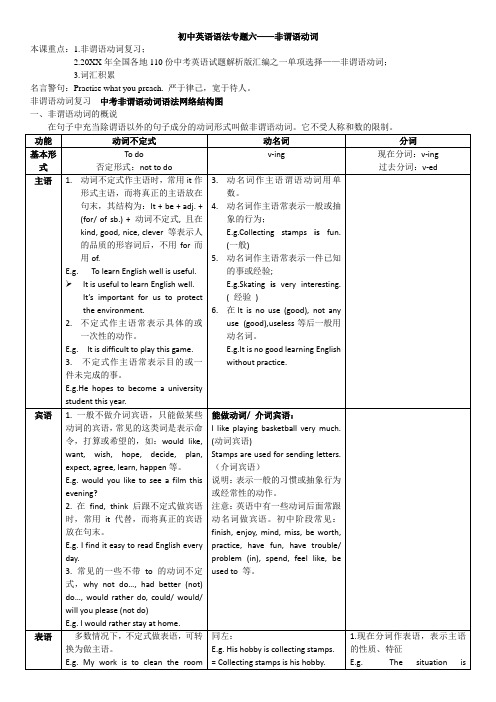
初中英语语法专题六——非谓语动词本课重点:1.非谓语动词复习;2.20XX年全国各地110份中考英语试题解析版汇编之一单项选择——非谓语动词;3.词汇积累名言警句:Practise what you preach. 严于律己,宽于待人。
非谓语动词复习中考非谓语动词语法网络结构图一、非谓语动词的概说1. like to do sth. 表示心理或一次性的具体动作like doing sth. 表示习惯性动作(类似的还有love, hate)2. begin / start to do sth begin / start doing sth.1)谈及一项长期活动或开始一种习惯时,使用doing.How old were you when you first started playing the piano?你几岁时开始弹钢琴?2)begin, start用进行时时,后面动词用不定式to doI was beginning to get angry。
我开始生起气来。
3)在begin, start 后接know, understand, realize这类动词时,常用不定式to do。
I begin to understand the truth。
4)物作主语时It began to melt.3. 感官动词+ doing/to do感官动词see, watch, , notice, look at, hear, listen to, smell, taste, feel + do表示动作的完整性,真实性;+doing 表示动作的连续性,进行性I saw him work in the garden yesterday.昨天我看见他在花园里干活了。
(强调"我看见了"这个事实)I saw him working in the garden yesterday. 昨天我见他正在花园里干活。
第六讲非谓语动词

第六讲非谓语动词一、总说:1.概念:不能在句中单独做谓语的动词形式,在句中起名词、形容词或副词作用。
2. 时态和语态:非谓语的时态和语态是相对的,要选择正确的非谓语形式,必须找准参照物,牢记一句口诀:___________________________________。
3. 分类: to do,v-ing和v-ed。
4. 否认形式:在非谓语标志性的单词前加not,即在to, v-ing或v-ed前面加not。
二、不定式:㈠不定式的时态:参照物是_____________,须比拟二者的_______关系。
①一般式to do:表示的动作和谓语动词动作_________或发生在谓语动词动作_______。
. He decided to go with us.I hope to see you next week.②进展式to be doing: 表示的动作和谓语动词动作__________。
. The boy pretended to be working hard.He seems to be reading in his room.③完成式to have done: 表示的动作发生在谓语动词动作_______。
. I’m sorry to have interrupted you.比拟该句和I’m sorry to interrupt you.的区别:㈡不定式的语态:参照物是___________,须比拟二者的________关系。
. a. The library __________ next year is very beautiful. (build)b. The room seems ___________________ already. (tidy up)注:①在easy, hard, difficult, pleasant, interesting等形容词后的不定式由于往往能补充出for sb.〔即动作的发出者〕, 所以通常使用主动形式:. a. The water is not fit to drink.b. The chair is comfortable to sit on.c. The problem is difficult to deal with.②某些动词的不定式作表语,需用主动形式表被动含义:e.g. a. Parents are to blame if their children do not have good manners.b. The house is to let.㈢不定式的句法功能:动词不定式除了不能单独作谓语外,几乎能充当句子中所有的句子成分。
6高中英语非谓语动词

6高中英语非谓语动词非谓语动词非谓语动词包括不定式(to do)、动名词(-ing)、现在分词(-ing)与过去分词(-ed)。
它们不受主语人称和数的限制,在句子中不能充当谓语,但可以充当句子的其他成分,并且有时态和动词不定式定义:动词不定式是非谓语动词的一种,它没有人称和数的变化,在句子中不能独立作谓语,但它仍保持动词的特点,可以有自己的宾语和状语。
一、不定式的意义1. 不定式的一般式:一般式表示的动作或状态发生在谓语动词表示的动作或状态的同时或之后。
当不定式的逻辑主语是这个不定式所表示的动作的承受者时,不定式一般要用被动式(to be done).eg: He seemed to be tired. The building to be finished next month is for our teachers.2. 不定式的进行式:进行式表示动作正在进行,与谓语的动作同时发生。
e.g. When I went to his home, he happened to be traveling around the world.3. 不定式的完成式:如果不定式所表示的动作或状态发生在谓语动词所表示动作或状态之前,就用完成式;若是在此基础上的被动含义,就用完成被动式( to have been done).e.g. He is said to have written a novel about theLong March.He is said to have been taught French when he was a child.4. 不定式的完成进行式:如果不定式的动作是在谓语所表示的时间之前一直在进行或有可能继续进行的动作,就要用完成进行式.eg: We’re happy to have been working with the experts all the month.二、不定式的用法:1. 不定式做主语:不定式做主语一般表示具体的某次动作。
非谓语动词(六)

英语:动词的非谓语形式【重点难点提示】一、重点是:1 .动词不定式(1)动词不定式的构成为:“to + 动词原形〞(有时可不带to)。
动词不定式没有人称和数和的变化。
(2)动词不定式既有名词的特性,又有动词的特性,它可以有自己的宾语和状语。
它在句中可充当主语、宾语、表语、定语、状语和补足语。
2 .动词ing形式的用法。
3 .动词过去分词的用法。
二、难点是:(1)在有些动词后动词不定式作宾语补足语时不带to。
(2)有些动词后只能接动词不定式作宾语。
(3)有些动词后只能接动词ing形式(即动名词)作宾语。
(4)有些动词后既可接动词不定式作宾语,也可接动词ing形式作宾语,但意思不同。
【同步达纲练习】Ⅰ .用括号中所给动词的适当形式填空。
1 .Bill lives in a place called (call) Gum Tree .2 .Let him have (have) a good rest .3 .Li Ping made the baby laugh (laugh) at last .4 .Miss Gao wants to take (take) these books to the classroom now .5 .She is ill .So she had better stay (stay) in bed for a few days .6 .You’d better not look (not ,look) out of the window in class .7 .It was very nice to play (play) with you .8 .They wake up their parents , called (call) :“Merry Christmas !〞9 .A lot of good land has gone with them ,(leave) only sand .10 .There was a fire (burn) in the fireplace .11 .The policeman told the boys (not ,play) football near the road .12 .Why not (go) to the park with us tomorrow ?13 .We’re free now .How about (fly) kites ?14 .We often hear our English teacher (sing) English songs .15 .One day ,his father saw him (sit) on some eggs .16 .Mr Wu have watched us (play) basketball for half an hour .17 .This morning I kept on (think) about the Christmas party this evening .18 .A lot of English people are good at (boat) .19 .We’re very thirsty .Let’s stop (drink) some water .20 .When the two boys saw the teacher ,they stopped (fight) at once .21 .Kate is a little ill .She doesn’t feel like (eat) anything these days .22 .In the old days ,the workers were made (work) more than 16 hours a day .23 .Have you finished (do) your homework yet ?24 .The heavy snow stopped many people from (go) to work .25 .Mary found a watch (lie) on the road on her way to school .26 .Do you like (fish) ?Yes .But I don’t like (fish) now .27 .Thank you for (lend) it to me .28 .Jim and his parents enjoy (live) in China very much .29 .—Do you mind my (smoke) here ?—Yes ,but I do .30 .—Would you like (e) to my birthday party this evening ?—Certainly .I’ll be glad to .31 .Don’t spend too much time (watch) TV .32 .The farmers are busy (get) ready for the next year .33 .We’re going to do some (shop) this Sunday .34 .—Shall we go (skate) tomorrow ?—That’s a good idea .35 .In England ,the first name is the (give) name .36 .Do you know another way of (say) the word ?37 .(take) a walk after supper is good for our health .38 .He quickly got up and went on (run) .39 .Sorry ,I have a lot of work (do) today .40 .It’s very kind of you (help) us .41 .It’s much better (give) than (receive) .42 .I don’t know what (do) next .43 .She’ll read a book tonight instead of (see) a film .44 .England is a (develop) country and India is a (develop) one .45 .That pot was used for (keep) tea hot after it was made .46 .I remember (tell) you the story before .47 .Take the second (turn) on the right .48 .The boy can’t get (dress) himself .49 .Don’t forget (lock) the door when you leave .50 .She’ll try her best (catch) up with the class .参考答案【同步达纲练习】Ⅰ .1 .called 2 .have 3 .laugh 4 .to take 5 .stay 6 .not look 7 .to play8 .calling 9 .leaving 10 .burning 11 .not to play 12 .go 13 .flying 14 .sing15 .sitting 16 .play 17 .thinking 18 .boating 19 .to drink 20 .fighting 21 .eating 22 .to work 23 .doing 24 .going 25 .lying 26 .fishing ,to fish 27 .lending28 .living 29 .smoking 30 .to e 31 .watching 32 .getting 33 .skating 34 . skating 35 .given 36 .saying 37 .Taking 38 .running 39 .to do 40 .to help 41 .to give ,to receive 42 .to do 43 .seeing 44 .developed ,developing 45 .keeping 46 .telling 47 .turning 48 .dressed 49 .to lock 50 .to catch非谓语动词专项练习题一、用所给动词适当形式填空:A . ① I want one magazine ______ . ( read )② My teacher wanted me ______ this question . ( answer )③ The woman wanted her husband ______ at once . ( examine )④ My bicycle wants _______ . ( repair )B . ① What made you ______ so ? ( think )② The girl was made _____ a man she didn`t love at all . ( marry )③ The show made me _______ in the study of science . ( interest )④ He raised the picture to make everyone _______ clearly . ( see )⑤ He raised his voice to make himself _______ . ( hear )⑥ My father himself made some candles _______ light . ( give )⑦ The boss made the workers _______ day and night . ( work )C . ① You`d better get your own room _______ . ( clean )② Yesterday he got his wallet _______ . ( steal )③ You should get your friends _______ you . ( help )④ The lecture got us _______ . ( think )⑤ Don`t get ________ in the rain . ( catch )D . ① Did you see somebody _______ into the room ? ( steal )② I saw him _______ in the room at that time . ( read )③ She was glad to see her child ________ good care of . ( take )④ I saw her _______ at the windows , thinking . ( seat )⑤ She was seen ________ here . ( e )E . ① I like _______ very much . ( swim )② I don`t like _______ TV at this time . ( watch )③ He never likes _______ at the meeting . ( praise )④ I feel like _______ to the cinema . ( go )⑤ Would you like ______ with me ? ( go )F . ① The man ______ at the meeting now is from the south . ( speak )② I don`t know the professor ______ at the meeting tomorrow . ( speak )③ He is the professor _______ to dinner . ( invite )G . ① It was so cold and he had the fire _______ all night long . ( burn )② I have a lot of exercises ________ today . ( do )③ "Do you have nay clothes _______ today ? "asked Mother . ( wash )④ You`d better have that bad tooth _______ out . ( pull )⑤ I want to have him _______ a car for me . ( find )H . ① He doesn`t do anything but _______ all day . ( play )② We have no choice but _______ . ( obey )③ I`m thinking of how _______ my English . ( improve )④ He made an apology for _____ late . ( be )I . ① He told us about his trip in an _______ voice . ( excite )② He told us his story in a _______ voice . ( tremble )③ At the sight of a snake , the little girl was very _______ . ( frighten )④ The boy was _______ , so I didn`t believe him again . ( disappoint )J . ① He is looking forward to ______ college . ( enter )② He is looking forward to _____ nothing . ( see )K . ① When he heard the news , he couldn`t help ________ with joy . (jump)② I couldn`t help ______ by the beauty of nature . ( strike )③ Sorry , I can`t help ______ the housework today . ( do )L . ①______ enough time , we`ll do it better . ( give )②______ a candle , he went on reading . ( light )③______ from the hill , the park looks more beautiful . ( see )④______ the people well , we must work hard at our lessons . ( serve )二、单项选择:〔1〕1. Saying always has less difficulty than _____.A. doneB. doingC. to doD. having done2. The girl is seriously ill. There is _____.A. nothing to do but send for a doctorB. something to do but to send for a doctorC. nothing to do but to send for a doctorD. anything to do but sending for a doctor3. The rest of the money _____ to Alice.A. is to sendB. are to sendC. is to be sentD. are to be sent4. Although swimming is his favorite sport, yet he doesn’t like _____ t oday.A. to swimB. swimmingC. swimD. to have swim5. She said she was sorry _____ the train, so she had to stay here for another day.A. missingB. having missedC. to missD. to have missed6. _____ the same mistake again made his parents very angry.A. His being madeB. He has madeC. He had makingD. His making7. I find the man hard _____.A. to be pleasedB. pleasingC. pleasedD. to please8. You’d better not have t he lights _____ all day long.A. burningB. burnedC. to burnD. being burnt9. It is _____ thinking about it now.A. of no useB. not useC. no useD. not of any uses10. —Would you like to sing a song for us?—_____.A. I prefer notB. I prefer not toC. I prefer to notD. I wouldn’t prefer11. He insisted _____ the working site.A. to be sent toB. being sent toC. on being sent toD. that to be sent to12. During the next ten years, she had to work hard _____ for the necklace.A. payingB. to payC. for payingD. in order to paying13. Janet was angry at _____.A. my not waiting for herB. I didn’t wait for herC. me not wait for herD. me to not wait for her14. I prefer staying at home _____ the theater.A. to go toB. for going toC. to going toD. rather than go15. Please get someone _____ the washing machine. I want to get it _____ as soon as possible.A. to repair/to be repairedB. repair/repairedC. to repair/repairingD. to repair/repaired16. _____ more time, he could have done the work much better.A. To be givenB. To giveC. GivenD. Giving17. The information _____ to us is of great value.A. broughtB. takenC. being takenD. being carried18. The building _____ next month will be a modern hospital.A. builtB. being builtC. to be builtD. be built19. Jessie was sick _____ such noise.A. of hearingB. to hearC. of being heardD. heard20. _____, he left the room.A. Finishing the workB. Had finished the workC. After finished the workD. Having finished the work21. _____ afraid _____ behind, Bill studied even harder than ever before.A. To be/of fallingB. Being/fallC. Being/of fallingD. To be/to fall22. The machine requires _____, so the workers are required _____ ready.A. repair/to getB. repairing/to getC. repairing/gettingD. to be repaired/getting23. Everyone dislikes _____.A. being laughedB. to be laughedC. being laughed atD. to be laughed at24. Would you like Helen _____ you since you have some difficulty?A. helpingB. to helpC. has helpedD. help25. He is beginning _____ his mistakes.A. correctB. to correctC. correctingD. corrected26. The Americans can’t use chopsticks _____.A. to eatB. to eatingC. eatingD. to eat with27. My wish is _____ the people well in the future.A. to serve forB. to serveC. servingD. serving for28. The poor boy, _____ with extraordinary strength, _____ from the ground.A. filled/roseB. filling/roseC. full/raisedD. filled/risen29. Most shops are open every day, Sunday _____.A. includingB. includedC. being includedD. to include30. _____ hot, he left only his stomach _____ with a piece of cloth.A. Feeling/coveringB. Feeling/coveredC. Felt/coveredD. Felt/covering31. He advised _____ a meeting _____ the problem.A. holding/to discussB. holding/for discussingC. to hold/to discussD. hold/discussing32. _____ the teacher, and he will tell you the answer.A. AskingB. AskC. If askD. If you ask33. The thief entered the room without _____.A. noticingB. being noticedC. having noticedD. having been noticed34. I happened _____ the story when she told me about it.A. having heard ofB. to have heard ofC. to be heard ofD. to hear of35. He is said _____ abroad already.A. having sentB. to be sendingC. to have been sentD. being sent36. He was made _____ working because of his poor health.A. stoppingB. to stopC. stoppedD. stop37. Do you consider it any good _____ again?A. to tryB. tryC. tryingD. for you to try38. I regret _____ you that we are unable to offer you a job.A. informingB. having informedC. to informD. to informing39. I would appreciate _____ back this afternoon.A. you to callB. you callC. your callingD. you’re calling40. She admitted _____ the key.A. being takingB. to takeC. having takenD. to have taken41. Besides _____, she is kind and tender.A. beautifulB. being beautifulC. she beautifulD. is beautiful42. I don’t want to speak to you, but I _____.A. have to speakB. have toC. must speakD. must43. I wondered whether the movie was _____ worth _____.A. very/seeingB. well/being seenC. very/being seenD. well/seeing44. The lecturer began by _____ us where the island was, and went on _____ about its history.A. telling/talkingB. to tell/to talkC. telling/to talkD. he told/talking45. After seeing the movie, _____.A. the book was read by himB. the book made him want to read itC. he wanted to read the bookD. the reading of the book interested him46. —Why doesn’t he take notes?—He has no pen _____. He seems _____ it.A. to write/to forget bringingB. to write with/to forget to bringC. to use with/to have forgotten to bringD. to write with/to have forgotten to bring47. When _____, water can be changed into vapor.A. heatedB. being heatedC. having been heatedD. to heat48. Having finished the work, _____.A. it was almost six o’clockB. a postman came and delivered the evening paper and some lettersC. supper had already been preparedD. we had a rest and then had supper49. _____, she felt quite shy at the party.A. As she a strangerB. Being a strangerC. According to a strangerD. She was a stranger50. Flank went to the swimming pool _____ swimming.A. to goB. goneC. goingD. go51. The _____ girl sat in the corner, crying.A. frightenB. frightenedC. frighteningD. fright52. On a _____ morning the little match girl was found _____ at the corner ofthe street.A. freezing/freezingB. freezing/frozenC. frozen/frozenD. frozen/freezing53. They found a _____ old man _____ on the ground when the door was broken open.A. dying/lyingB. dying/liedC. dead/liedD. dead/lain54. Be quick, or you’ll get _____ in the rain.A. to be caughtB. catchingC. to catchD. caught55. Who could have imagined such a sweet-tempered girl as Jane _____ such a thing!A. doingB. to doC. will doD. does56. He told me not to leave the pot _____.A. uncoveredB. to uncoverC. to be uncoveredD. uncovering57. The experience made him _____ the study of science.A. interest inB. to interest inC. interesting inD. interested in58. He managed to make himself _____ with his _____ English.A. understood/breakingB. understood/brokenC. understand/breakingD. understand/broken59. Did you hear the sound like that of a door _____?A. burstB. to burst inC. burst inD. to be burst in60. I was deep in thought, so I didn’t notice _____.A. him to e inB. him e inC. he e inD. him ing in61. Have you any objection to _____ there on foot?A. be goingB. goingC. goD. went62. The wallet was returned to him without anything _____.A. missedB. to be missedC. missingD. to miss63. The teacher was far from _____ with the result of the exam.A. satisfyB. satisfiedC. being satisfiedD. satisfying64. Hurry up! Mother is sure _____ us at home.A. waitingB. to wait forC. to be waitingD. to be waiting for65. Mr Brown is said _____ a new novel.A. to writingB. to have been writtenC. to be writtenD. to have written66. When _____ into a warm room, the ice soon changed to water.A. to takeB. to be takenC. takingD. taken67. The old man walked in the street _____.A. followed his sonB. and following his sonC. and followed by his sonD. followed by his son68. _____ with fear, a hungry fox hid himself in a small cave, _____ his tail to the rain.A. Trembling/exposingB. Trembled/exposedC. Trembled/exposingD. Trembling/exposed69. The two farmers _____ what appeared to be small guns forced the enemy officer to hand in his map.A. carriedB. were carryingC. carryingD. had carried70. Six _____ nine makes fifteen.A. added toB. adds toC. added up toD. added by71. The lecturer _____ will be here tomorrow.A. to talk about so muchB. to be talking about so muchC. so much talking aboutD. so much talked about72. _____ some of the questions _____, the Premier said goodbye to us.A. Left/unansweredB. Leaving/unansweredC. Leaving/unanswerD. Left/unanswer73. _____ her mother had e, her face lit up.A. HearingB. Having heardC. When heardD. When she heard74. _____ in white, she looks much more beautiful.A. WearingB. DressingC. DressedD. Having dressed75. _____, the boy couldn’t enter his house.A. Since the key had lostB. The key being lostC. Lost the keyD. Having lost the key76. The Arctic is considered _____ the northern part of the Atlantic.A. having beenB. to have beenC. to beD. being77. It is impossible for the work _____ within a month.A. finishingB. being finishingC. to finishD. to be finished78. I am too glad _____ you.A. to seeB. seeingC. sawD. at seeing79. There is _____ what the weather will be like.A. not knowingB. no knowingC. not knowD. no known80. The bottle _____ the poison was sent to the laboratory for a test.A. containingB. containedC. which containingD. which is contained81. _____ the children, we are all sure everything will be all right.A. With him taken care ofB. With he taken care ofC. With him taking care ofD. With he taking care of82. At first she wanted to go to the cinema, but on second thoughts she decidedit would be better _____ at home and _____.A. stay/workB. to stay/to workC. stay/to workD. to stay/work83. He didn’t speak to me, let alone _____ me.A. helpB. to helpC. helpingD. helped84. The people’s government does its best to have the living standard of the people _____.A. risenB. raisedC. riseD. raise85. The little girl found her teddy bear _____ under the bed.A. hidingB. to hide86. Mr Smith is _____ to our English evening.A. more pleased than to eB. more pleased to e thanC. more than pleased to eD. more pleasing than to e87. Once _____, a bad habit is rather difficult to get rid of.A. formedB. to be formedC. formingD. having formed88. You can have no idea what is _____ to do when you e to see the strange boss.A. orderingB. being orderedC. to orderD. to be ordered89. The noise of the door _____ the baby.A. closing wakenB. to close wokeC. closed wakeD. being closed woke90. Please leave a window _____, for it’s too hot.A. openB. openingC. to openD. opened91. _____ not knowing the answer to such an easy question!A. HopeB. DecideC. ImagineD. Think92. He asked to be kept _____ about developments.A. informingB. informedC. to informD. inform93. _____ everywhere, the wolves had nowhere _____ themselves.A. Hunting/to hideB. To hunt/to hideC. Hunted/hidingD. Hunted/to hide94. It _____ this way.A. used to doB. used to be doneC. is used to doingD. is using to do95. They have a lot of difficulty _____.A. in overingB. to overe it96. Didn’t you forget us _____ together in the countryside?A. to workB. to workingC. workingD. worked97. You always hear about planes _____ because of technical faults.A. having been delayedB. being delayedC. having delayedD. delaying98. These are needed for _____ clothes, paper and other necessaries.A. the making ofB. making ofC. to makeD. makings99. Have the police caught _____ yet?A. the prisoner who escapesB. the escaping prisonerC. the escaped prisonerD. the prisoner have escaped100. Do you still remember _____ you when you stayed in hospital?A. my mother and me visitingB. my mother’s and my visitingC. my mother and me to visitD. my mother and me to have visited三、单项选择〔2〕1. There ______ no classes yesterday, we paid a visit to the Great Wall.A. wasB. beingC. wereD. had been2. The policeman rushed into the room only ______ an old lady lying on the ground.A. foundB. findC. findingD. to find3. The boy lay on the ground, his eyes ______ and his hands ______.A. closing; tremblingB. closed; tremblingC. closed; trembledD. closing; trembled4.______, the girls raced on to the second runners.A. Stick in handB. With a stick in her handC. Sticks in handD. Sticks in hands5. Each of them got up early ______ to catch the early bus.A. to hopeB. hopingC. so thatD. and6. How pleased the Emperor was ______ what the cheats said!A. hearingB. heardC. hearD. to hear7. We should prevent pollution ______ happily.A. from livingB. livingC. to livingD. to live8.I am busy now, so I can’t help ______ the machine.A. repairB. to have repairedC. repairingD. fixing9. Jane came very close ______ a gold medal for Britain in the Olympics.A. to winB. winningC. to winningD. to be won10. The boy seated himself in the corner with his back ______ to his father.A. turningB. to turnC. to be turnedD. turned11. ----By the way, when did you get your bedroom ______?----Last week.A. to paintB. paintedC. paintingD. to be painted12. He likes ______, but he doesn’t like ______ today because it is too cold.A. to swim; to swimB. swimming; swimmingC. to swim; swimmingD. swimming; to swim13. There is ______ what the weather will be like.A. not knowingB. no knowingC. not knowD. no known14. The novel is said ______ into many languages.A. to translateB. being translatedC. to have been translatedD. having been translated15. I’m examining the position he has just finished ______ the possible mistakes in it.A. correctingB. to correctC. correctedD. correct16. They would not allow him ______ across the enemy line.A. to risk goingB. risking to goC. for risk to goD. risk going17. He spent as much time as he could _____ the child.A. teachingB. to teachC. teachD. for teaching18. ----Alice, why didn’t you e yesterday?----I ______, but I had an unexpected visitor.A. hadB. wouldC. was going toD. did19. How pleased the Emperor was ______ what the cheats said!A. hearingB. to hearC. heardD. hear20. ______ the room, a letter was laid on the ground.A. EnteringB. Having enteredC. He enteredD. Mrs Green entering21. They set out ______ for the ______ boy.A. searching; losingB. searching; lostC. to search; lostD. to search; missed22. ______ her mother had e, her face lit up.A. HearingB. Having heardC. When hearingD. When she heard23. They arrived at their university very late, ______ the gate closely shut.A. foundB. to findC. findD. finding24. ----Do you have anything more ______, sir?----No. You can have a rest or do something else.A. typingB. to be typedC. typedD. to type25. The manager promised to keep me ______ of how our business was going on.A. to be informedB. on informingC. informedD. informing26. With a lot of difficult problems ______, the manager felt worried all the time.A. to settleB. settlingC. settledD. being settled27. Will those ______ the children from abroad e to the headmaster’s office?A. teachingB. teachC. who teachesD. who teaching28. After ______ for the job, you will be required to take a language test.A. being interviewedB. interviewedC. interviewingD. having interviewed29. They apologized for ______ to attend the meeting.A. their not being ableB. their being not ableC. them not ableD. them being able not30. They would not allow him ______ across the enemy line.A. to risk goingB. risking to goC. for risk to goD. risk going31. ______ to nuclear radiation, even for a short time, may produce variants(变异体) of genes in human bodies.A. Being exposedB. Having exposedC. ExposedD. After being exposed32. China became the 143rd member of the World Trade Organization on December 11, 2001, thus ______ its 15-year wish to join the global trade body.A. having realizedB. realizedC. realizingD. to realize33. Tom looked at Jenny, tears ______ his eyes, and shouted out the words ______ in his heart for years.A. filling; having hiddenB. filled; hiddenC. filling; hiddenD. filled; hiding34. They apologized for ______ to attend the meeting.A. their not being ableB. their being not ableC. them not ableD. them being able not35. Which will you enjoy ______ your vacation, traveling abroad or working in the countryside?A. to spendB. spendC. spendingD. spent36. ----Will you please tell us how you can seize the robbers?----I will spend a whole week ______ in your room to wait for their ing.A. lockingB. to lockC. lockedD. being locked37. I regret ______ you that they are unable to e to your wedding tomorrow.A. informingB. having informedC. to have been informedD. to inform38. He wondered if he could slip out of the lecture hall without anyone ______.A. noticingB. noticedC. to noticeD. being noticed39. After ______ for the job, you will be required to take a language test.A. being interviewedB. interviewedC. interviewingD. having interviewed40. He spoke in such a high voice ______ out in the street.A. as to be heardB. to be heardC. as to hearD. to hear41. As early as 1647 Ohio made a decision that free, tax-supported schools must be set up in every town ______ 50 households or more.A. havingB. to haveC. to have hadD. having had42. The building project ______ next year is, I think, not easy ______ in time.A. being carried out; to pleteB. carried out; to be pletedC. to be carried out; to pleteD. to be carried out; to be pleted43. The reason ______ she gave for not ing to the party is that her mother wouldn’t allow her to.A. thatB. whatC. whyD. because44. Excuse me, could you tell me how to get to the Grand Hotel? I thought it was on this corner, but I seem to ______ a mistake.A. makeB. be makingC. having madeD. have made45. ----Here’s a new pair of shoes for you.----Thank you, but there’s no need ______ a new pair for me.A. to have boughtB. to buyC. buyingD. to be buying46. What worried the boy most was ______ to visit his father in the hospital.A. his not allowingB. his not being allowedC. having not been allowedD. his being not allowed47. To do a bit for the motherland, ______.A. working hard is necessaryB. to learn a foreign language is neededC. it is important to master scienceD. one should serve the people whole-heartedly48. Everything ______ into consideration, they ought to have another chance.A. to takeB. takenC. to be takenD. taking49. The officials discussed the plan that they would like to see ______ the next month.A. carry outB. carrying outC. to carry outD. carried out50. With a lot of difficult problems ______, the manager felt worried all the time.A. to settleB. settlingC. settledD. being settled51. ----Do you have anything more ______, sir?----No, you can have a rest or do something else.。
高中英语非谓语的知识点总结
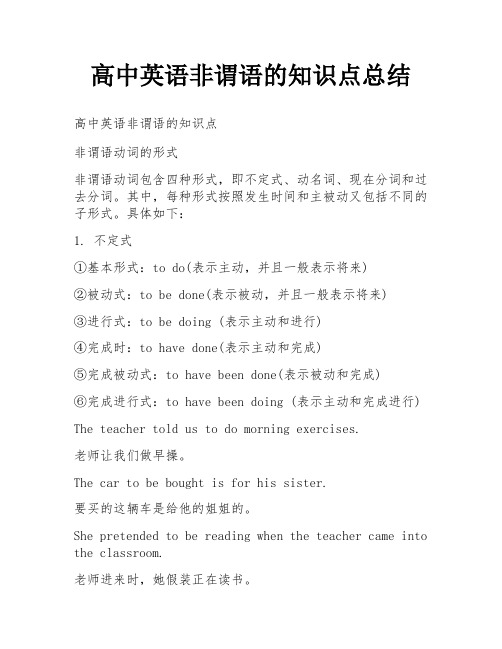
高中英语非谓语的知识点总结高中英语非谓语的知识点非谓语动词的形式非谓语动词包含四种形式,即不定式、动名词、现在分词和过去分词。
其中,每种形式按照发生时间和主被动又包括不同的子形式。
具体如下:1. 不定式①基本形式:to do(表示主动,并且一般表示将来)②被动式:to be done(表示被动,并且一般表示将来)③进行式:to be doing (表示主动和进行)④完成时:to have done(表示主动和完成)⑤完成被动式:to have been done(表示被动和完成)⑥完成进行式:to have been doing (表示主动和完成进行)The teacher told us to do morning exercises.老师让我们做早操。
The car to be bought is for his sister.要买的这辆车是给他的姐姐的。
She pretended to be reading when the teacher came into the classroom.老师进来时,她假装正在读书。
The thief is said to have escaped.据说小偷已经逃跑了。
The thief is said to have been arrested.据说小偷已经被抓住了。
She is said to have been working in the factory over the last 20 years.据说在过去的20年里,她一直在这家工厂工作。
2. 动名词①基本形式:doing (表示主动)②被动式:being done(表示被动)③完成式:having done(表示主动和完成)④完成被动式:having been done(表示被动和完成)Travelling in space by ordinary people will be mon in the future.在未来,普通人在太空旅行将会是普遍的事情。
非谓语动词的六大用法
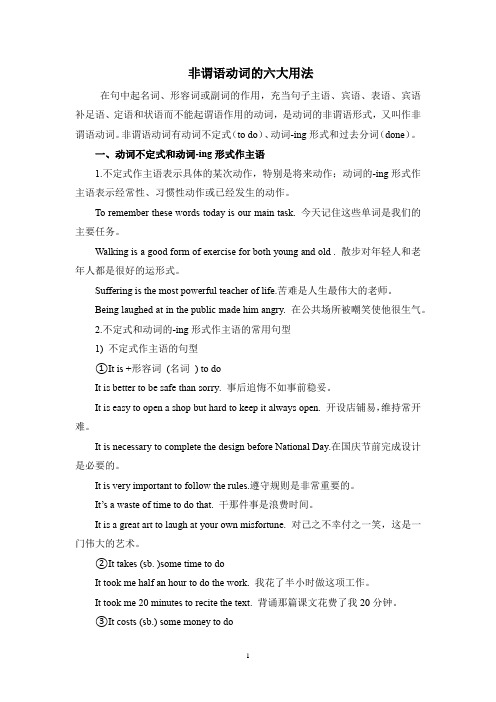
非谓语动词的六大用法在句中起名词、形容词或副词的作用,充当句子主语、宾语、表语、宾语补足语、定语和状语而不能起谓语作用的动词,是动词的非谓语形式,又叫作非谓语动词。
非谓语动词有动词不定式(to do)、动词-ing形式和过去分词(done)。
一、动词不定式和动词-ing形式作主语1.不定式作主语表示具体的某次动作,特别是将来动作;动词的-ing形式作主语表示经常性、习惯性动作或已经发生的动作。
To remember these words today is our main task. 今天记住这些单词是我们的主要任务。
Walking is a good form of exercise for both young and old . 散步对年轻人和老年人都是很好的运形式。
Suffering is the most powerful teacher of life.苦难是人生最伟大的老师。
Being laughed at in the public made him angry. 在公共场所被嘲笑使他很生气。
2.不定式和动词的-ing形式作主语的常用句型1) 不定式作主语的句型①It is +形容词(名词) to doIt is better to be safe than sorry. 事后追悔不如事前稳妥。
It is easy to open a shop but hard to keep it always open. 开设店铺易,维持常开难。
It is necessary to complete the design before National Day.在国庆节前完成设计是必要的。
It is very important to follow the rules.遵守规则是非常重要的。
It’s a waste of time to do that. 干那件事是浪费时间。
It is a great art to laugh at your own misfortune. 对己之不幸付之一笑,这是一门伟大的艺术。
高中英语语法填空(6)(非谓语动词)
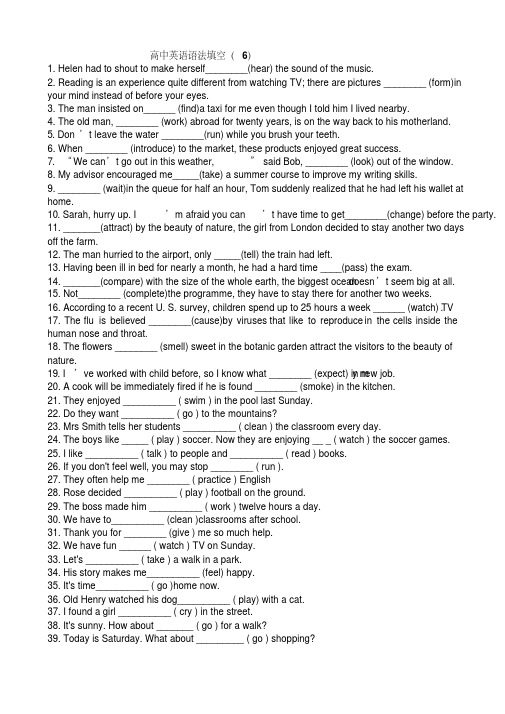
高中英语语法填空(6)1. Helen had to shout to make herself________(hear) the sound of the music.2. Reading is an experience quite different from watching TV; there are pictures ________ (form)inyour mind instead of before your eyes.3. The man insisted on______ (find)a taxi for me even though I told him I lived nearby.4. The old man, ________ (work) abroad for twenty years, is on the way back to his motherland.5. Don’t leave the water ________(run) while you brush your teeth.6. When ________ (introduce) to the market, these products enjoyed great success.7. “We can’t go out in this weather,” said Bob, ________ (look) out of the window.8. My advisor encouraged me_____(take) a summer course to improve my writing skills.9. ________ (wait)in the queue for half an hour, Tom suddenly realized that he had left his wallet at home.10. Sarah, hurry up. I’m afraid you can’t have time to get________(change) before the party.11. _______(attract) by the beauty of nature, the girl from London decided to stay another two daysoff the farm.12. The man hurried to the airport, only _____(tell) the train had left.13. Having been ill in bed for nearly a month, he had a hard time ____(pass) the exam.doesn’t seem big at all.14. _______(compare) with the size of the whole earth, the biggest ocean15. Not________ (complete)the programme, they have to stay there for another two weeks..16. According to a recent U. S. survey, children spend up to 25 hours a week ______ (watch) TV17. The flu is believed ________(cause) b y viruses that like to reproduce in the cells inside thehuman nose and throat.18. The flowers ________ (smell) sweet in the botanic garden attract the visitors to the beauty ofnature.y new job.19. I’ve worked with child before, so I know what ________ (expect) in m20. A cook will be immediately fired if he is found ________ (smoke) in the kitchen.21. They enjoyed __________ ( swim ) in the pool last Sunday.22. Do they want __________ ( go ) to the mountains?23. Mrs Smith tells her students __________ ( clean ) the classroom every day.24. The boys like _____ ( play ) soccer. Now they are enjoying __ _ ( watch ) the soccer games.25. I like __________ ( talk ) to people and __________ ( read ) books.26. If you don't feel well, you may stop ________ ( run ).27. They often help me ________ ( practice ) English28. Rose decided __________ ( play ) football on the ground.29. The boss made him __________ ( work ) twelve hours a day.30. We have to__________ (clean )classrooms after school.31. Thank you for ________ (give ) me so much help.32. We have fun ______ ( watch ) TV on Sunday.33. Let's __________ ( take ) a walk in a park.34. His story makes me__________ (feel) happy.35. It's time__________ ( go )home now.36. Old Henry watched his dog__________ ( play) with a cat.37. I found a girl __________ ( cry ) in the street.38. It's sunny. How about _______ ( go ) for a walk?39. Today is Saturday. What about _________ ( go ) shopping?。
高考英语语法贯通课件:专题(六 非谓语动词(含答案)

2.非谓语动词作感官动词(短语)、使役动词的宾补 (1)感官动词(短语)see, watch, observe, look at, notice, hear, listen to, feel 的宾语补足语有四种形式, 以 see 为例:
see+
ddooisntgh.sth看. 看见见…………做.正了..做….………⇒
②(2016·四川高考)For 25 days, she never left her baby, not even to find something _t_o_e_a_t__ (eat)! 解析:句意:25 天中,她寸步不离她的孩子,甚至不去找东 西吃!不定式 to eat 作定语,修饰前面的不定代词 something。 ③(2015·全国卷Ⅰ)Abercrombie & Kent, a travel company in Hong Kong, says it regularly arranges quick getaways here for people _l_i_v_in_g__ (live) in Shanghai and Hong Kong. 解析:句中已有谓语动词 arranges,故此处应考虑填非谓语 动词。由于 live 与其所修饰的名词 people 之间为逻辑上的 主动关系,故用表示主动意义的现在分词形式。
宾语与宾补为逻 辑上的主动关系
宾语+
being done
d看on见e看…见……被.…做.正.在.被.做.⇒
宾语与宾补为逻 辑上的被动关系
I saw him leave a few minutes ago. 我看见他几分钟前离开了。 As I got closer, I saw him kicking his legs in the air and breathing heavily. 当我走近时,我看见他的腿在空中乱踢,并且呼吸沉重。 I’d like to see the plan carried out. 我想看到这个计划被执行。
高中英语真题-第六节 非谓语动词
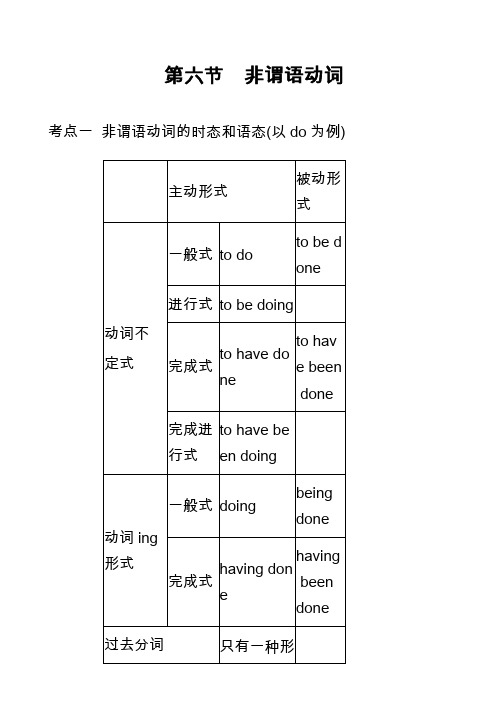
第六节非谓语动词考点一非谓语动词的时态和语态(以do为例)考点二非谓语动词作状语1.不定式作状语(1)作目的状语,有时用in order to或so as to。
To be a winner,you need to give all you have and try your best.要想成为赢家,你要付出所有并竭尽全力。
(2)作结果状语,常用结构enough to,too...to ...,only to等。
I'm too tired to stay up any longer.我太累了,不能再熬夜了。
(3)作原因状语,此时常与表示情感的形容词连用,如glad,happy,frightened,surprised等。
I'm very glad to meet you here.在这儿遇见你我真高兴。
[名师点津] 在“主语+系动词+形容词+to do”的结构中,常用主动形式表示被动含义。
The question is very difficult to answer.这个问题很难回答。
2.动词ing形式作状语(1)动词ing形式作状语时与谓语动词所表示的动作同时或几乎同时发生,having done表示先于谓语动词所表示的动作。
Not knowing his address,I can't call on him.由于不知道他的地址,我无法拜访他。
Not having received a reply,he decided to write again.由于没有收到回信,他打算再写一封。
(2)动词ing形式可作时间、原因、方式、伴随、结果、让步等状语。
The children came in,singing and jumping.孩子们又唱又跳地进来了。
3.过去分词作状语(1)过去分词作状语时与句中主语构成逻辑上的动宾关系,且先于谓语动作发生。
Inspired by his speech,we took action at once.在他演讲的鼓舞下,我们马上行动了起来。
初中英语语法公式(6)非谓语动词

初中英语语法公式(6)非谓语动词公式1To do+谓语动词+其他(不定式作主语):To learn Chinese well is very difficult. 学好汉语很难。
公式2主语+谓语动词+to do…(不定式作宾语):I can’t afford to buy a car. 我买不起汽车。
公式35主语+谓语+it+形容词+(for sb.)to do…(不定式作宾语)I think it hard to learn English well. 我认为学好英语很困难。
公式3主语+及物动词+宾语+ (to) do…(不定式作宾语补足语)He told us to work hard. 他告诉我们要努力学习。
公式4be+情感形容词+to do…(不定式作状语)She was happy to hear the news. 听到这个消息她很高兴。
公式5to do…/in order to do…/…so as to do…(不定式作状语)To find out more about courses, write to this adress. 想了解更多课程的信息,按这个地址来函。
公式6动名词+谓语动词+其他(动名词作主语)Watching TV too much is bad for eyes. 看太多的电视对眼睛不好。
公式7主语+及物动词(短语)+动名词(动名词作宾语)Would you mind my singing here? 我在这里唱歌,你介意吗?公式8... without + N/doing ...结构︰主语+动词+…without+名词/动名词…。
说明︰此句型意为“主语没有(不用)…”。
without 当“没有;不用;假如没有;当…不”解,是介系词,后面接名词(代名词)或动名词,用法相当于“and ... not”或“if(when)…not+动词”。
I can’t start a fire without matches. 我没有火柴不能点火。
考研英语语法 非谓语动词(6)

LECTURE 6 非谓语动词本堂目标熟悉非谓语动词的四种基本形式有其基本用法,重点掌握一些固定句型与结构中的动名词、同一动词(短语)后不定式和动名词比较、现在分词与动名词的区别。
基础预习非谓语动词是指那些在句中不能单独充当句子谓语成分的动词形式。
基本形式有四种:不定式(infinitive)、动名词(gerund)、分词(participle)和独立主格结构。
一、不定式动词不定式是非谓语动词中使用最广泛的一种,在句子中,它除了不能作谓语外,可以担当其他任何成分,可以作主语、宾语、表语、状语、定语和宾语补足语。
它在句子中起名词、形容词和副词的作用。
1.不定式的时态与语态动词不定式由不定式符号to+动词原形构成,但有时to也可以省略。
动词不定式不仅具有主动与被动的形式,而且还有一般、进行和完成三种时态形式。
一般时具有较鲜明的将来意义,所以常用来表示尚未发生的动作,这一点非常重要。
进行式和完成式则分别表示正在进行的动作和先于谓语动词发生的动作。
【例1】【例3】(93-语法)2.不定式的语法功能动词不定式具备名词、形容词和副词三种词性,所以能充当的句子成分也很多。
1)作主语不定式结构作主语时,为避免头重脚轻,一般用it作形式主语。
2)作宾语以不定式直接作宾语的动词多为“同意、决定、试图、安排、保证、拒绝、喜欢、害怕、假装、申请”等含义的词。
【例】用it作形式宾语,而将其真实宾语不定式后置的动词多属“认为、判定、感觉”等含义的词,如consider,feel,find,judge,make,think等。
3)作表语不定式结构作表语,跟在系动词后面,说明主语的状态。
【例】(04-Text 1)4)作定语在下列名词/代词后常接动词不定式作定语:【例】(02-翻译)5)作状语不定式结构可以单独作状语,表示目的,经常以in order to ,so as to ,such…as to 等形式出现。
不定式结构单独作状语,还可表示结果。
非谓语动词非谓语形式(详细)
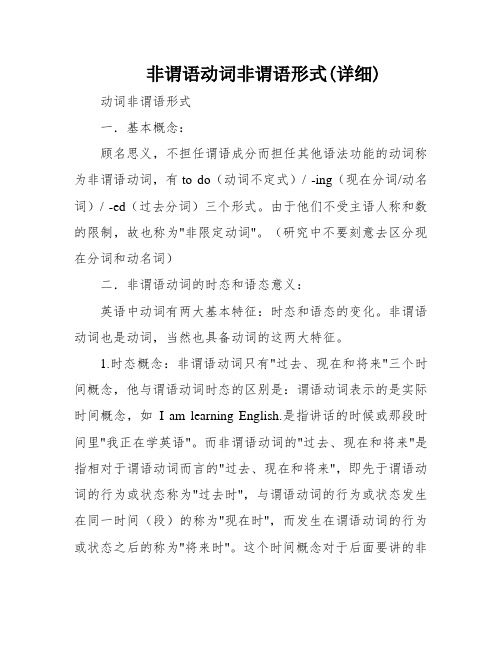
非谓语动词非谓语形式(详细)动词非谓语形式一.基本概念:顾名思义,不担任谓语成分而担任其他语法功能的动词称为非谓语动词,有to do(动词不定式)/ -ing(现在分词/动名词)/ -ed(过去分词)三个形式。
由于他们不受主语人称和数的限制,故也称为"非限定动词"。
(研究中不要刻意去区分现在分词和动名词)二.非谓语动词的时态和语态意义:英语中动词有两大基本特征:时态和语态的变化。
非谓语动词也是动词,当然也具备动词的这两大特征。
1.时态概念:非谓语动词只有"过去、现在和将来"三个时间概念,他与谓语动词时态的区别是:谓语动词表示的是实际时间概念,如I am learning English.是指讲话的时候或那段时间里"我正在学英语"。
而非谓语动词的"过去、现在和将来"是指相对于谓语动词而言的"过去、现在和将来",即先于谓语动词的行为或状态称为"过去时",与谓语动词的行为或状态发生在同一时间(段)的称为"现在时",而发生在谓语动词的行为或状态之后的称为"将来时"。
这个时间概念对于后面要讲的非谓语动词的句法功能是非常重要的。
2.语态概念:与谓语动词一样,非谓语动词也有主动语态和被动语态之分。
也就是要记住四句话:(1)表示将来时;(2)表示现在时;(3)表示曩昔时(一定是被动的)(4)动词不定式的完成时表示过去时非谓语动词的上述时态和语态概念是理解非谓语动词句法功能、应试判题和翻译的基础。
请你判断一下,下面句子中的非谓语动词是什么时态和语态:Your duty is to look after the sick child。
(你的责任是照料这个病孩。
将来/主动)The sick child needs to be looked after by a special person。
非谓语动词(完整版)
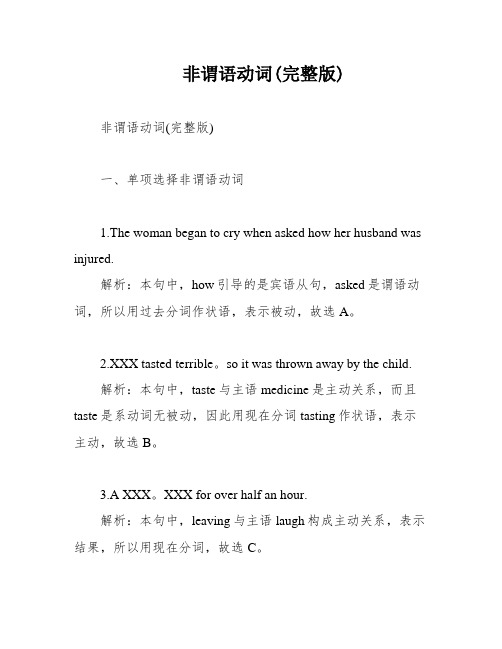
非谓语动词(完整版)非谓语动词(完整版)一、单项选择非谓语动词1.The woman began to cry when asked how her husband was injured.解析:本句中,how引导的是宾语从句,asked是谓语动词,所以用过去分词作状语,表示被动,故选A。
2.XXX tasted terrible。
so it was thrown away by the child.解析:本句中,taste与主语medicine是主动关系,而且taste是系动词无被动,因此用现在分词tasting作状语,表示主动,故选B。
3.A XXX。
XXX for over half an hour.解析:本句中,leaving与主语laugh构成主动关系,表示结果,所以用现在分词,故选C。
4.When asked for his views about his teaching job。
Philip said he found it very interesting and rewarding.解析:本句中,when引导的是省略句,完整的是when he was asked his view about his job as a teacher,这里当从句中的主语与主句的主语一致,并且从句的谓语动词有be时,这时从句的主语与be同时省略,故选B。
二、改写句子1.Being asked how her husband was injured。
XXX.2.XXX.3.A XXX for over half an hour.4.Philip found XXX when he was asked for his views about it.1.The company has decided to implement a new policy to ce the use of plastic bags。
2017年高考英语- 非谓语动词-专题练习(六)及答案解析
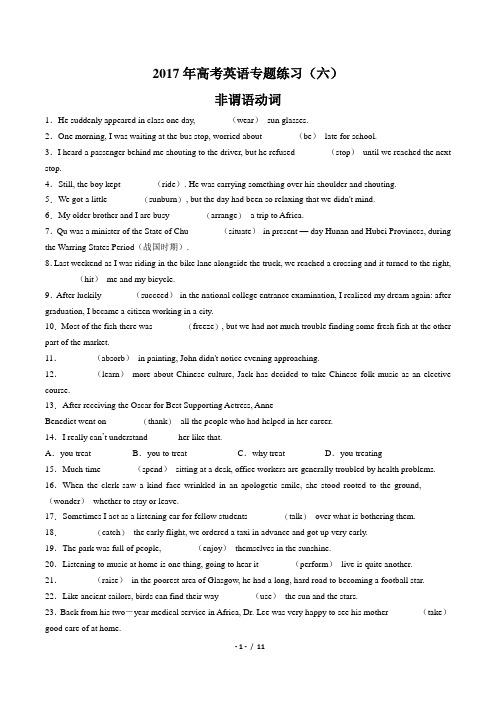
2017年高考英语专题练习(六)非谓语动词1.He suddenly appeared in class one day, ______ (wear)sun glasses.2.One morning, I was waiting at the bus stop, worried about ______ (be)late for school.3.I heard a passenger behind me shouting to the driver, but he refused ______ (stop)until we reached the next stop.4.Still, the boy kept ______ (ride). He was carrying something over his shoulder and shouting.5.We got a little ______ (sunburn), but the day had been so relaxing that we didn't mind.6.My older brother and I are busy ______ (arrange)a trip to Africa.7.Qu was a minister of the State of Chu ______ (situate)in present — day Hunan and Hubei Provinces, during the Warring States Period(战国时期).8.Last weekend as I was riding in the bike lane alongside the truck, we reached a crossing and it turned to the right, ______ (hit)me and my bicycle.9.After luckily ______ (succeed)in the national college entrance examination, I realized my dream again: after graduation, I became a citizen working in a city.10.Most of the fish there was ______ (freeze), but we had not much trouble finding some fresh fish at the other part of the market.11.______ (absorb)in painting, John didn't notice evening approaching.12.______ (learn)more about Chinese culture, Jack has decided to take Chinese folk music as an elective course.13.After receiving the Oscar for Best Supporting Actress, AnneBenedict went on ______ (thank)all the people who had helped in her career.14.I really can’t understand ______ her like that.A.you treat B.you to treat C.why treat D.you treating15.Much time ______ (spend)sitting at a desk, office workers are generally troubled by health problems. 16.When the clerk saw a kind face wrinkled in an apologetic smile, she stood rooted to the ground, ______ (wonder)whether to stay or leave.17.Sometimes I act as a listening ear for fellow students ______ (talk)over what is bothering them.18.______ (catch)the early flight, we ordered a taxi in advance and got up very early.19.The park was full of people, ______ (enjoy)themselves in the sunshine.20.Listening to music at home is one thing, going to hear it ______ (perform)live is quite another.21.______ (raise)in the poorest area of Glasgow, he had a long, hard road to becoming a football star. 22.Like ancient sailors, birds can find their way ______ (use)the sun and the stars.23.Back from his two-year medical service in Africa, Dr. Lee was very happy to see his mother ______ (take)good care of at home.24.Well, it always takes time to consider before ______ (make)a decision.25.Now, the merchant's 1st wife is a very loyal partner and has made great contributions in maintaining his wealth and business as well as ______ (take)care of the household.26.Eventually, I decided ______(contact)University Student Legal Services for help about this matter. 27.Woo Sing stopped ______ (think)about these strange actions, saying to himself, “This boy is fooling me. He does everything that I do.”28.Most probably, it may lead to a small talk which often brings harm or disrespect to others, thus ______ (hurt)others' feelings.29.Yes, and there is a lot of points of view when you listen to talk shows. I usually enjoy ______ (listen)to them. 30.Taking a taxi is five times as expensive as ______ (take)a bus.31.I then realized she had no arms or legs, just a head, a neck and upper body, ______ (dress)in a little white skirt.32.The price of tea ______ (pick)in March is extremely high.33.We have also formed a special support group to help young people stop ______ (smoke).2017年高考英语专题练习(六)非谓语动词答案1.wearing2.being3.to stop4.riding’s5.sunburned/sunburnt6.arranging7.situated8.hitting9.succeeding10.frozen11.Absorbed12.Tolerant13.to thank14.D15.spent 16.wondering 17.to talk18.To catch 19.accepted 20.being performed 21.Raised 22.using 23.taken 24.making 25.taking26.to contact 27.to think 28.hurting 29.listening 30.taking 31.dressed 32.picked 33.smoking2017年高考英语专题练习(六)非谓语动词解析1.考查现在分词. 根据句子结构可知, 已有谓语动词appeared, 动词wear前又没有并列连词, 故应为非谓语动词作状语, 表示伴随情况;又因主语he与wear之间是主动关系, 故要用现在分词.2.3.考查不定式. 动词refuse后要接不定式作宾语, refuse to do sth 拒绝做某事.4.考查固定短语. 然而这个男孩一直骑个不停. keep doing sth一直做某事.5.考查过去分词. 我们有点晒黑了. 动词sunburn晒黑, 此处get +done结构为被动结构, 表示某一事件或事故的发生, 着重强调动作.6.考查动名词. be busy(in)doing. . . 忙于做某事.7.考查过去分词. 表示位于何地时, 用be situated in/on. 过去分词situated作定语, 相当于定语从句which was situated.8.考查现在分词. 句意:上周我骑自行车时旁边有辆卡车, 当到十字路口时, 它向右转, 撞到了我和我的自行车. hitting作结果状语.9.10.考查过去分词. 此处作表语, 表状态, 要用frozen(冰冻的).易错起源1.非谓语动词类别和句法功能11.句意:沉迷于绘画中, 约翰没有注意时间已到了傍晚. 考查非谓语动词. 此处的Absorbed in painting相当于原因状语从句Because he was absorbed in painting的省略.非谓语动词句法功能的注意事项:◆不定式1.介词后的动词不定式只限于作介词except和but的宾语, 此时except/but意为“除了, 除去”. 其主要搭配有:can but + 动词原形;只能、只得……cannot help(choose)but + 动词原形:……不能不……do nothing but + 动词原形:只做……There is nothing to do but + 动词原形:……只有做……have no choice but to do:只有做……例如:The last bus having gone, I could do nothing but go home on foot.(省略to)I cannot choose but tell him the truth.(省略to)She could do nothing but leave.(省略to)I have no choice but to cry.(不能省略to)2.不定式在使役动词have, let, make以及感官动词see, look at, watch, notice, observe, hear, listen to, feel后的宾补, 不定式符号要省略, 但这些句子变为被动结构时, 就必须带符号to. 例如:I often hear him sing this song. →He is often heard to sing this song.I saw them play in the park. →They were seen to play in the park.3.不定式作定语与所修饰的名词之间存在着逻辑上的主谓关系或动宾关系. 如果作定语的不定式使不及物动词, 或者不定式所修饰的名词或代词是其动作的地点、工具等, 不定式后须有相应的介词. 但名词way, place, way除外. 例如:He is not a man to tell lies.(主谓关系)There will not be enough space to stand in on the earth.(动宾关系)Here is some paper for you to write on.The boy has a nice pen to write with.We found a way to solve this problem(in).通常使用不定式作定语的情况有:(1)不定式表示将来;(2)用来修饰被序数词、最高级或no, all, any等限定词的中心词. (3)用来修饰一些抽象名词, 常见的有:ability, disability, chance, idea, fact, excuse, promise, answer, reply, attempt, belief, way, reason, time等. 例如:During my holidqy I borrowed some books to read.(表将来)She was the first woman to win the gold medal in the Olympic Games.(有序数词修饰)I have no chance to escape.(修饰抽象名词)Do you have the ability to read French? (修饰抽象名词)4.不定式作状语时可以表示目的、原因、结果或条件. 表示目的时可用in order to, so as to换用;表示条件时, 一般把表示条件的动词不定式置于句首, 句中的谓语动词常含有will, shall, should, would, can, must, could等情态动词. 例如:He sat down to have a rest.(表目的)He woke up to find everybody gone.(表结果)I’m very pleased to hear from him.(表原因, 主要是表示喜、怒、哀、乐)To look at him, you can’t help laughing.(表条件, 谓语动词含有can)He was too excited not to say a word.(表程度)He is old enough to go to school.(表程度)◆过去分词、不定式和现在分词的被动式作定语的区别:这三种形式作定语, 主要是体现在动作发生的时间上的区别. 过去分词表示的动作或是在谓语所表示的动作之前或是没有一定的时间性;现在分词的被动式作定语时表示的动作正在发生或是与谓语动词所表示的动作同时发生;不定式的被动式作定语时, 表示一个未来的动作. 例如:The bridge to be built is named Stone in honor of the hero.(将要修建的)The bridge being built is named Stone in honor of the hero.(正大修建的)The bridge built is named Stone in honor of the hero.(己经修建了的)Have you read the novel written by Dickens?He is a teacher loved anti respected by all students.(没有时间性)Listen! The song being sung is very popular with the young men.(表正在)The question to be discussed at the Sunday meeting is very important.(表将来)在英语中, 表示“感觉状态”的动词现在分词和过去分词形式作表语和定语时, 现在分词表示“令人感到……”, 指主语或被修饰的词给人的感觉;过去分词表示“感到……” , 指主语或被修饰的词本身的感觉. 例如: interesting令人感兴趣的interested感到有兴趣的exciting令人感到激动的excited感到激动的shocking令人感到震惊的shocked感到震惊的◆过去分词、不定式和现在分词作宾语补足语的区别:1.感官动词(see, look at, watch, notice, observe, hear, listen to, feel)和使役动词(have, let, make)后的宾补有三种形式, 即原形动词(不带to的不定式), 现在分词和过去分词. 现在分词表示主动和正在进行, 过去分词表示被动完成, 不定式表示主动和完成. 注意:make不能接现在分词作宾补.例如:I heard her sing a Chinese song jut now.(表示主动, 完成)I heard her singing a Chinese song when I passed by her room last night.(表示正在进行)I heard the Chinese song sung many times.(表示被动)The captain got/have the soldiers moving to ward the front after a short rest.(不能用make)I looked down at my neck and found my necklace gone.(表示状态)I was surprised to find my hometown changed a lot.(表示完成)2.动词leave后接三种形式作宾补时, 表达的具体含义是“使……处于某种状态”. 例如:It is wrong for you to leave the machine running.(主动, 正在进行)The guests left most of the dishes untouched.(被动, 完成)My workmate left, leaving me to do all the rest work.(主动, 将来)My workmate left, leaving all the rest work to be done.(被动, 将来)◆过去分词和现在分词作状语的区别:1.一般来说, 过去分词表示被动完成的动作, 现在分词表示主动进行的动作. 例如:Seen from a distance, the mountain looked like a man. ks5uKs5u. Com]Seeing the mountain, he always thinks of his hometown.2.现在分词的被动一般式表示正在进行的被动动作, 过去分词表示被动完成的动作. 例如:Being helped by the teacher, she will learn English well.Helped by the teacher, she has learned English well.3.现在分词的被动完成式表示先于谓语动词动作发生的动作, 过去分词所表示的动作, 有时发生在谓语动词之前, 有时与谓语动词同时发生, 有时表示未来的被动动作或状态. 例如:Having been used for a long time, the watch needs to be mended.Used in this way, the word shouldn’t be taken as a verb.Given more time, we will finish the work perfectly.◆独立主格结构分词短语作状语时, 其逻辑主语必须与句子的主语一致. 如果与句子的主语不一致, 那么分词短语就需要有自己的逻辑主语, 这就是独立主格结构形式.独立主格结构是分词短语意义上的逻辑主语, 通常由名词或代词来充当, 放在分词之前. 因为没有实际的主语和谓语, 独立主格结构不是句子, 一般放在句首或句末, 充当时间、原因、方式等状语. 例如:Winter having come, it’s getting colde r and colder.The homework finished, the child went home.His leg badiy hurt, he had to stay in bed.Time permitting, we’ll visit the Summer Palace.She lay against the wall, the sun shinning upon her.从例句可以看出, 独立主格结构中分词的逻辑主语和句子的主语是两个不同的人或物, 因此, 分词前的名词或代词不能省略.独立主格结构也可以由“with/without + 名词或代词+ 分词、不定式、形容词、副词或介词短语”构成. 例如:The boy stared at the teacher, with his mouth opon.With his parents away, the boy became naughtier.The teacher came into the classroom, with a book in her hand(= book in hand).She sat still, with her eyes closed.(被动, 状态)She sat still, with her eyes looking at the ceiling.(主动, 正在)With you to help me, I could do it better.(主动, 将来)With a lot of problems settled, the mayor went to have a holiday.(被动, 完成)ks5uWith a lot of problems to be settled, the mayor has a hard time.(被动, 将来)◆垂悬分词作状语垂悬分词是现在分词一种特殊用法, 其逻辑主语是句子非主语部分中指人或物的某一名词或代词, 或泛指“我们”. 例如:Searching along the street, it had taken him along time to find a clinic.(searching 的逻辑主语是句中him 所指的人)Walking or sleeping, this subject is always in my mind.(walking or sleeping 的逻辑主语是句中my所指的“我”)Using the electric energy, it is necessary to change its form.(using 的逻辑主语泛指“我们”)易错起源2.非谓语动词的时态和语态12.动词不定式的时态和语态当不定式的逻辑主语是不定式所表示的动作的承受者时, 一般使用不定式的被动语态, 形式有一般式和完成式(进行式没有被动式). 例如:Her father disappeared, never to be heard from again.(hear from和his father之间是被动关系)The book is sid to have been tramlated into many languages.(translate和the book之间是被动关系)注意:不定式中使用主动代替被动的情况:(1)不定式所修饰的名词或代词构成逻辑上的主谓关系时, 不定式往往用主动形式. 例如:I haven’t got a key to unlock the door.(to unlock the door的逻辑主语是a key)(2)不定式所修饰的名词或代词构成逻辑上的动宾关系, 又和主语构成主谓关系时, 不定式往往用主动形式. 例如:I haven’t got a book to read.(I为不定式的逻辑主语, a book为不定式的逻辑宾语)(3)不定式作宾语形容词的状语, 和句中的主语构成了逻辑上的动宾关系, 不定式多用主动, 实际上形容词后省略了for one或for people. 例如:The book is difficult(for me)to understand.He is hard(for me)to work with.(4)在there be结构中, 如果考虑必须有人去完成某事时, 用主动;如果强调事情本身必须完成时, 用被动. 例如:There is a lot of to be done.(工作被作)There is a lot of to do.(需要人去做)动名词的时态和语态动名词一般式所表示的动作与谓语所表示的动作同时发生或是在谓语动词所表示的动作之后发生. 如果动名词的动作发生在谓语动词所表示的动作之前, 则用动名词的完成式. 如果动名词的逻辑这样是动名词动作的承受者, 这时用动名词的被动式. 例如:We are interested in playing chess.(同时)She is looking forward to hearing from you again.(之后)I’m sorry for not having kept my promise.(之前)The little boy was afraid of being left at home alone.(被动)ks5uThe house showed no sign of having been damaged.(之前, 被动)易错起源3.非谓语动词的固定搭配13.英语中非谓语动词的固定搭配是因词而定, 没有固定的规律. 考生只有牢记它们的形式, 才能成功破题. 1.下列动词或动词短语后面只接动名词作宾语:admit, allow, appreciate, avoid, consider(考虑), delay, dislike, enjoy, escape, excuse, finish, imagine, keep, mind, miss(错过), practice, risk, resist, suggest, suffer等动词;be used to(习惯于), insist on, can’t help(情不自禁), can’t stand(无法忍受), give up, feel like, keep on, look forward to, put off, devote to, stick to, object to, thank you for, be busy(in), get down to, lead to, see to, have difficult/trouble(in), have a good/wonderful/hard time(in)等动词组.2.下列动词或动词短语后面能接动名词或不定式作宾语, 但意义上有区别:forget/remember/regret to do忘记/记住/后悔去做某事forget/remember/regret doing忘记/记得/后悔已经做过某事stop to do停下来接着做另一件事stop doing停止做一件事mean to do意欲、企图做某事mean doing意味着做某事go on to do做完某事接着做另一件事go on doing继续做同一件事try to do努力、试图做某事try doing尝试着做某事3.有些短语作状语是固定结构:judging from, generally/ frankly/ honestly/ strictly speaking, considering(that). . .(考虑到……), supposing/ providing(that). . .(假如……), seeing(that). . .(既然, 由于……), to tell you the truth, to make things worse, to begin with(首先, 第一). 例如:Judging from his accent, he must be a southerner.Tuning to the left, he saw a bus passing.Considering everything, he did a good job.Seeing(that)she is lawfully old enough to get married, I don’t see how you can stop her.易错起源4.非谓语动词逻辑主语的表达形式和否定形式【错误解答】A或B14.非谓语动词的逻辑主语也就是非谓语动词的动作执行者. 在不定式中, 逻辑主语是of或for的介词宾语, 或是句子的主语, 或是句子的宾语.例如:It is important for us to work hard.(to work is important. 只能用for)It is kind of you to help me to clean the room.(you are kind. 只能用of)We want to go with you to have a picnic.Little Tom liked to be taken to the cinema.I want the report to be typed as quickly as possible.The manager asked me to type the report as quickly as possible.动名词的复合结构在句中作主语时, 其逻辑主语必须是形容词性物主代词或名词的所有格;作宾语、表语时, 其逻辑主语是形容词性物主代词、人称代词、名词的所有格或普通格;无生命名词或有生命的名词表示泛指时, 必须用名词的普通格或人称代词的宾格. 例如:Tom’s coming surprised all of us(主语)His not attending the meeting made the manager very angry.(主语)Would you mind me/my opening the window?(宾语)They all thought Tom’s /Tom going there a great mistake.(宾语)Is there any hope of their team winning the game?(无生命)I have never heard of women landing the moon.(有生命, 但表泛指)分词作状语时, 其逻辑主语和主句的主语是一致的, 如果不同则要用到独立主格结构形式(见上文).例如:Being a student, you must study hard.When crossing the streets you must be careful.If heated to high temperature, ice can change into water.15.句意:大部分时间坐办公桌, 办公室职员通常被健康问题所困扰. time 与spend之间构成被动关系, 另外该题实际考查了非谓语动词的独立主格结构.16.17.Sometimes I act as a listening ear for fellow students (talk)over what is bothering them.17.句意:有时候我充当同学们的倾诉对象, 让他们通过倾诉释放心头的烦心事. for sb to do sth是不定式的复合结构, 在句中作定语, 修饰a listening ear.18.句意:为了赶上早班飞机, 我们提前预定了出租车并且很早就起了床. 此处用不定式作目的状语, 表示提前预定出租车并且早起的目的.19.If(accept)for the job, you'll be informed soon.19.句意:如果录用你做这份工作, 你将会很快得到通知. 句子的主语you和动词accept之间为逻辑上的动宾关系, 故用过去分词.20.句意:在家听音乐是一回事, 去现场听音乐演奏是另外一回事. hear. . . doing. . . 听到……正在做……, 此处宾语it与动词perform之间为动宾关系, 故要用现在分词的被动形式作宾语补足语.21.22.句意:就像古时候的水手一样, 鸟能利用太阳和星星找到它们的路. 根据语境, use与其句中隐含的逻辑主语birds之间为主动关系, 故用v. -ing形式的一般式, 在句中作伴随状语, 表示与find同时发生.23.句意:在他两年的非洲医疗服务回来后, 李博士很高兴地看到他在家中被照顾得很好的母亲. 考查非谓语动词. 此处考查非谓语动词做后置定语, mother和take good care of之间是被动关系, 故用过去分词. 24.考查动名词. 在做决定之前要认真考虑. before是介词, 后跟动名词.25.考查动名词. as well as 连接并列结构, take在形式上要与maintain保持一致.26.考查不定式. decide to do. . . 决定做某事.27.考查不定式. Woo Sing停下来想这些奇怪的行为……. stop to do sth停下来去做某事.28.考查现在分词. 句意:很有可能, 这种好奇心会导致闲言碎语, 而那些闲言碎语会对别人造成伤害或者不尊重, 这样就伤害了别人的感情. 现在分词作结果状语, 主语a small talk 和hurt之间为主谓关系, 故要用现在分词.29.30.考查动名词. 这里taking a bus和taking a taxi进行比较.31.考查过去分词. 此处过去分词短语dressed in. . . 相当于定语从句who was dressed in.32.考查过去分词. tea与动词pick之间是被动关系, 故用过去分词作后置定语.33.考查动名词. stop to do sth 停下来去做某事;stop doing sth 停止正在做的事情. 根据语境可知“我们还成立了一个特殊的小组去帮助青少年戒烟”. stop smoking戒烟.- 11 -/ 11。
专题6非谓语动词-2022届新高考英语基础记忆及题型解题技巧(原题+答案解析)

非谓语动词非谓语动词{形式{肯定式{不定式{主动形式:to do,to be doing,to have done,to have been doing被动形式:to be done,to have been done现在分词、动名词{主动形式:doing,having done被动形式:being done,having been done过去分词:done否定式:以上肯定形式前加not,如not to do,not doing,not to be done等复合结构{动名词的复合结构:名词所有格/形容词性物主代词+动名词不定式的复合结构:for sb./sth.+不定式句法功能{不定式:作主语、宾语、补语、状语、表语、定语分词:作补语、定语、状语、表语动名词:作主语、宾语、定语、表语功能辨析{(★★★)作宾语{只用不定式作宾语的动词只用动名词作宾语的动词(词组)既可用不定式,也可用动名词作宾语,但意义上有区别的动词(词组)need,want,require,deserve后的不定式、动名词作宾语的用法(★★★)作定语{不定式作定语分词作定语动名词作定语to be done,being done,done作定语的区别(★)作主语、表语(★★★)作状语{不定式作状语分词作状语独立成分作状语独立主格结构(★)作补语{用不定式作宾语补足语/主语补足语的动词及动词词组不定式、分词作感官动词宾语补足语/主语补足语不定式、分词作使役动词宾语补足语/主语补足语动词leave,keep,find,catch及介词with后作宾补的不定式、分词的区别...be said/believed/supposed/reported/considered/found/thought后需用不定式作主语补足语非谓语动词概述1.什么是非谓语动词?非谓语动词是动词的特殊形式,在句子中可以充当谓语以外的成分。
2.非谓语动词在句子中的作用一个句子中已存在一个主句(含谓语动词),又没有连词的情况下,再出现一个动词则用非谓语动词。
非谓语动词(整理)

order permit remind request teach
tell want warn enable wish
1. 她叫我呆在这儿。 She asked me to stay here.
2.请允许我介绍Mr. White给你们。
Please allow me to introduce Mr. White to you.
In addition to _d__o_in_g__his own work well, he is ready to help others.(do)
不定式的时态和语态
主动
被动
一般式 to do 进行式 to be doing
to be done
完成式 to have done to have been done 否定式 在to 前加 not
前加疑问词。
Mr.Lin will teach us how to use the computer.
Can you tell me where to get the book?
注意
D. 作简短回答或避免不必要的重复时,
动词不定式常常省去to 后面的动词, 只保留to 。
A:Would you like to come to my party?
4. 介词but, except, besides + to do ,但是如果这 些介词前有行为动词do的各种形式,那么, 介词 后的不定式不用to.
5. 一些特定结构中: why not do… (为什么不做…) had better do …(最好做…) would rather do … (宁愿;宁可 )
Made Curie was the first person in the world to receive two Nobel Prizes.
- 1、下载文档前请自行甄别文档内容的完整性,平台不提供额外的编辑、内容补充、找答案等附加服务。
- 2、"仅部分预览"的文档,不可在线预览部分如存在完整性等问题,可反馈申请退款(可完整预览的文档不适用该条件!)。
- 3、如文档侵犯您的权益,请联系客服反馈,我们会尽快为您处理(人工客服工作时间:9:00-18:30)。
2.(2013·山东高考)I stopped the car ____C____ a short break
as I was feeling tired. A.take
B.taking
C.to take
D.taken
原则二:作伴随状语一般用v.-ing形式的一般式
1.(2013·重庆高考)When I was little, my mother used to sit
to be on. A.to watch
B.watching
C.watched
D.to have watched
3.(2011·四川高考)___C___an important role in a new movie,
Andy has got a chance to become famous.
A.Offer
A.bathed
B.bathing
C.to have bathed
D.having bathed
原则三:作原因状语一般用现在分词或过去分词(二者
的选择取决于其与逻辑主语的关系),而在某些表示情感的
形容词后作原因状语常用不定式
1.(2013·北京高考)____B____ the course very difficult, she
by my bed, ____B____ me stories till I fell asleep.
A.having told
B.telling
C.told
D.to tell
2.(2013·湖南高考)The sun began to rise in the sky,
____B____ the mountain in golden light.
1.(2013·湖南高考)____C____ warm at night, I would fill
the woodstove, then set my alarm clock for midnight so
I could refill it. A.Staying
B.Stayed
C.To stay
D.Stay
B.expressed
C.to express
D.to be expressed
原则六:作介词的宾语一般用 v.-ing 形式的一般式,但在介词
but, except 后需跟不定式作宾语(是否带 to 可参照“前 do 后不 to”
的原则)
1 . (2013·江 苏 高 考 )Shortly after suffering from a massive earthquake and _____C___ to ruins, the city took on a new look.
A.reducing
B.reduced
C.being reduced
D.having reduced
原则七:作主语表示一般行为常用v.-ing形式的一般
式。用it作形式主语时,常用不定式作真正主语,it's no
use/no good/useless doing结构除外
1.(2013·福建高考)___C_____basic first-aid techniques will
decided to move to a lower level.
A.Find
B.Finding
C.To find
D.Found
答案:B
2.(2012·全国卷Ⅱ)The old man sat in front of the television
every evening, happy ___A_____ anything that happened
B.Offering
C.Offered
D.To offer
原则四:在“be+性质形容词+不定式”结构中,形容
词修饰说明不定式时,常用不定式的主动形式表示被动含义
1.(2012·辽宁高考)This machine is very easy ___D_____.
Anybody can learn to use it in a few minutes.
A.break
B.breaking
C.broken
D.to break
原 则 五 : 一 些 抽 象 名 词 如 chance, warning, ability,
ambition, attempt, offer, decision, anxiety, way 等词后常用不
定式的一般式作定语
1.(2013·北京高考)Volunteering gives you a chance ___D_____
2.若确定是非谓语,则再考虑其逻辑主语是什么,逻 辑主语与动词之间存在什么样的逻辑关系。若是主 谓关系,则用主动式;若为动宾关系则用被动式。
3.确定关系后再确定时态,根据谓语动词与非谓语动 词所表示的动作发生的先后顺序来确定时态。
原则一:作目的状语只能用不定式的一般式,一般位
于句首,有时也可位于句中或句末
lives, including your own. changed
D.to change
2 . (2011·湖 南 高 考 )The ability ___C_____ an idea is as
important as the idea itself.
A.expressing
A.operating
B.to be operating
C.operated
D.to operate
2.(2011·安徽高考)Tom asked the candy makers if they
could make the chocolate easier ___D___ into small pieces.
非谓语动词
考情解读 从近三年高考来看,在对非谓语动词的考查中非谓语 动词作状语依然为考查的重点,并已从作状语的一枝独秀向 作定语或其他成分发展。测试点呈现出“情景化”和“设问 角度多样化”的趋势。
非谓语动词解题三部曲
1.弄清是谓语还是非谓语。英语一句话中一般只有一 个谓语动词。若有两个或两个以上的动词且有连词 连接,则必须用谓语形式;若无连词连接,则必须 用非谓语形式。
help you respond quickly to emergencies.
